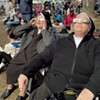Published June 29, 2005 at 6:13 p.m.
Shortly after nine on a recent Thursday night, in a house on a quiet street in Burlington, three single guys in their late twenties act out a classic American scene.
The roommates turn on some reggae, break out a six-pack of microbrew and unwind by playing a few hands of poker. At least, the scene is nearly classic: Instead of gathering around a table, the friends lounge in a bedroom, in front of a computer screen. A copy of a highly technical poker manual lies on the bed -- right next to an open copy of Hemingway's The Sun Also Rises.
The men are logged onto PokerStars.com, one of many online poker websites. They don't play all at once; rather, they take turns at the computer. Every 20 minutes or so, one of them rotates out from the PC desktop and leaves the room to smoke a cigarette -- or a joint -- and one of the others takes his place.
Sound dull? It's not. Though they're not playing each other, these guys, who insist on using colorful pseudonyms or "screen names" for this article, are betting against real people. "Hardell" gestures at the image of a green-felt table on the screen during a round of a low-stakes Texas Hold 'Em Tournament. He points out that his opponents come from all over the country. "I'm playing this guy from Bend, Oregon," he says, "another guy from Mount Pearl, somewhere, and somebody from Knoxville. I've seen players from Alaska to South Africa to Bangladesh."
The Burlington group is also winning -- and losing -- real money. "Woland" logs on for a few hours nearly every day, and reports that he's having a good week. "I've taken on $400," he says. "That's in my real bank account." The actual gambling transaction is handled by the Royal Bank of Scotland, and then filtered through one of five online banking or credit-card services back to his account in the States. Some months, Woland makes enough to pay his rent; he once scored $700 in a single sitting. "But," he says, "it should be noted I lost all of that."
A few hundred dollars seems like chump change compared to the pot pocketed two weeks ago by a South Burlington player whose screen name is "Stonekiller." According to a tournament leaderboard, he or she won a whopping $24,000. Not that that's any kind of record. "Ralph," the third member of the Burlington threesome, says he's seen up to $120,000 in play on one game table. "There's millions of dollars in cash being traded by people in their bedrooms," he says. "It's really awing, the kind of money floating around out there. It's a ridiculous amount."
Ralph is not exaggerating. Online gambling -- particularly online poker, which comprises the largest and fastest-growing sector of the industry -- is wildly popular. On this Thursday night, the PokerStars site alone has attracted 46,770 users worldwide. Company spokesman Rich Korbin confirms that 245 PokerStars players are registered just in the 05401 zip code. A site called PartyPoker.com, run by PartyGaming PLC, boasts more than 121,000 registered users -- up from just 105 users in 2002.
According to an article in last Sunday's New York Times, the entire online poker industry, which makes its money by skimming a small percentage off each pot, produced revenues of more than $1 billion last year, up from $92 million two years before. About 90 percent of that money is coming out of the pockets of American gamblers. In short, online poker has become a new national pastime, even though it's probably illegal, and possibly dangerous.
*****
The success of the online card game is entwined with the growing national obsession with live poker, particularly with the Texas Hold 'Em version of the game. In it, players get two of their own cards, and must make the best possible poker hand from five communal cards dealt face-up on the table. Players contribute to a rotating ante -- a move called "posting the blinds" -- and bet once before the communal cards are drawn, then after the "flop" of the first three cards, again after the fourth card is revealed, and again after the fifth.
This game has saturated contemporary American culture. The televised World Series of Poker draws millions of viewers on ESPN. Texas Hold 'Em charity fundraisers -- such as the one at the Elks Club in Burlington last weekend, or the one coming up the end of July at Nectar's -- are popping up all over. Even The New York Times has launched a weekly poker column.
That obsession is fueling, and being fueled by, the online games, which are available anywhere, anytime, to anyone with an Internet connection. Bruce MacDonald, a spokesman for Foxwoods Casino in Connecticut, calls Internet poker "a feeder market" for casino poker tables. He welcomes the boom in online poker, which he says is partly responsible for the increase in the game's popularity at Foxwoods. The casino's poker business grew 40 percent in the last year. Its 2003 Annual World Poker Tour Tournament had 311 players, with a $3 million pot; the 2004 event drew 674 players with a $6.7 million prize. "People will learn online, hone their skills," MacDonald says, "then come to the casino to try them out in person."
But playing online also allows gamblers to save a trip to the casino. And it lets them game the system. It takes big bucks to buy a spot in some of these large tournaments -- a buy-in to the World Series of Poker costs 10 grand. But if you play your cards right, you can win a seat at the table for considerably less by entering and winning online satellite tournaments. The aptly named Chris Moneymaker of Tennessee accomplished this feat in 2003. He paid $39 to enter a PokerStars satellite tournament and won his way into the final round of the World Series of Poker. He emerged victorious, walking away with a cool $2.5 million. The 2004 champ did the same.
Hardell, Ralph and Woland clearly wouldn't mind being the next Moneymaker, so to speak, but realistically, they're just playing for kicks. Ralph admits that he rarely nets any cash on the games -- in fact, he usually loses his initial investment. But he says he gets his money's worth of entertainment. "I've put $250 in, and I've been able to play about $3000 worth of poker," Ralph says. "That's not bad."
It's true, the fast-paced game offers its share of thrills. Each hand might last less than a minute, with "cards" turning over quickly, at which point you might call for -- with the click of a mouse -- 25 cents, or raise the pot by $25, or $2500, depending on the "table" where you've chosen to play. Says Hardell, "You go all in on that fourth card, and you're sitting on the edge of your seat, yelling, 'No queen, no queen!' Then, bam! -- you just won $300."
Woland compares the feeling to a cocaine high. "It can seem from an outside perspective that we're sitting at our fucking computers doing nothing," he says. "But when there's money on the line, it's exciting. Your heart pounds."
Is all this heart-pounding action legal? It depends on whom you ask. Rich Korbin, a spokesman for PokerStars, hesitates before he answers the question. Speaking on the phone from the Rio Hotel in Las Vegas -- where he's watching the 2005 World Series of Poker Tournament -- Korbin finally replies: "I say yes. But I think if you asked 20 attorneys that question, you might get 10 yeses and 10 nos." He adds, as an afterthought, "We invite people to check with their local jurisdiction."
Attorneys and law enforcement officers in Vermont say the activity is absolutely illegal. And it's easy to see why. After all, gambling outside of Native American casinos is prohibited in most states, including this one. There are exceptions for certain nonprofit events, in which a percentage of the proceeds goes to charity. And it's legal to organize a March Madness office pool, for example, provided that the winner takes all the profits or donates them to charity.
But in Vermont, it's not even legal to play cards with your friends in the privacy of your own home, or bet on the outcome of a game, whether you're playing volleyball in Battery Park or shooting craps in Roosevelt. And you certainly can't just set up a casino on Church Street. So how could it be legal to bet thousands of dollars over a wireless Internet connection while sitting in a downtown Burlington cafe?
It's not, according to attorney Paul Van de Graff, chief of the Criminal Division for Vermont's Department of Justice. But he concedes that the situation is confusing. The problem, he explains, is that anti-gambling laws were written well before the digital age. "Traditional gambling cases are mostly Mob cases," dealing with old-fashioned "numbers rackets," Van de Graff says. The laws weren't designed to apply to the complicated dealings of online gambling operations, which are largely based overseas. PokerStars, for example, is registered as a corporation in Costa Rica, though Korbin says most of its employees live in Europe. Their clients do their banking offshore.
Van de Graff and other prosecutors say the statute most likely to apply in this case is called the Interstate Wireline Act, also known simply as the Wire Act. It outlaws the use of wire communication for wagering on "sporting events or contests." But it's still unclear whether the law applies to guys playing poker in a bedroom in Burlington, because the argument hasn't been tested in court. In fact, Van de Graff says, though Vermonters are obviously participating, he has yet to receive an online gambling case from any federal agency, such as the Federal Bureau of Investigation.
Ditto for the State's Attorney General's Office. Assistant Attorney General John Treadwell says it appears that winning or losing money online would qualify as a misdemeanor under Vermont law, but he hasn't gotten any cases from the local police.
South Burlington Police Sgt. Peter LaVallee says that's probably because no one has complained about it, at least not to his department. The issue is not on their radar screen yet. LaVallee seemed surprised to hear that a South Burlington resident recently won $24,000 online. When asked if such a person is likely to be apprehended and charged, he replies, "I wouldn't think so." LaVallee thinks Stonekiller ought to be more worried about reporting those earnings to the IRS. "The taxman cometh," he warns.
Bill McSalis, Supervisory Special Agent for the FBI in Vermont, says his department "hasn't had any illegal Internet gambling operations brought to our attention." Nor has the FBI spent much time researching online gambling here, because, McSalis says, "We allocate resources based on the priority of threats." This is also the agency responsible for investigating kidnapping, medical fraud and terrorism; a seemingly victimless crime such as online gambling takes a backseat to homeland security. McSalis seems eager to act on any tips he may receive, however.
The bottom line? It's more or less safe -- if not necessarily legal -- to ante up online, at least until law enforcement agencies decide to crack down on the practice. Or until legislators rewrite the laws to specifically target online gamblers. Arizona Republican Senator Jon Kyl has been trying to do just that for years, without success. In fact, last year, the World Trade Organization ruled against the U.S., maintaining that American laws criminalizing online gambling actually violate international law.
That's good news for gamblers, according to Tim Ashton, a web developer who's about to launch an online gambling site called poserFish, where people can make so-called "friendly bets" on the contest or event of their choice. He is frankly unafraid of a legislative crackdown. "The industry thinking seems to be that the voices fighting against [online gambling] have been trying to outlaw it for 10 years, and it hasn't gone anywhere," Ashton says in a phone interview from Phoenix. "It's not going to go anywhere."
*****
The argument over whether online gambling is legal obscures the larger question of whether it should be. Burlington-based addictions counselor Joel Rosinsky believes the practice should be outlawed. "Personally, I don't see the upside to this," he says.
Rosinsky is one of two licensed gambling-addiction counselors in the state; the other is Joy Mitchell, a Bellows Falls therapist, who works for the Vermont Council on Problem Gambling. Both report an increase in calls over the past two years -- Rosinsky says online gambling now accounts for 25 to 30 percent of his. He is adamant that online gambling is "a major, major problem ... bigger than anybody is aware of." And, unlike his usual middle-aged and elderly clientele, the online gamblers are often college kids and teenagers.
One older Vermonter contacted Rosinsky recently "in a fit of desperation." The man, a small-business owner, had lost $250,000 in one day playing online poker. "He had lost his home, lost his business," Rosinsky remembers. "He called me feeling suicidal." The counselor, who says he never heard from the man again, notes that problem gamblers have a much higher suicide rate than alcoholics or other addicts.
Rosinsky cautions that online gambling is, in many ways, more dangerous than the live kind. "For one thing, it's so accessible," he says. "And gambling is like drinking and drugging: A lot of it is done in secret. Online, you're in private. There's nobody looking over your shoulder saying, 'Are you nuts?'"
Rosinsky enumerates three stages of problem gambling. First, the Winning stage, in which the gambler takes realistic, reasonable risks. "It's like being a social drinker," he says. "If it's not affecting your life, you're fine." Some gamblers never proceed from here, but the ones that do enter the Losing stage, in which they begin to make bigger bets to cover their losses. "This is like someone who says, 'I'll have one drink,' and ends up having six," suggests Rosinsky. Finally, there's the Desperation stage. "That's when the house has three mortgages and has been repossessed," he says. "The car's gone, the family's gone, the police are after you."
This kind of talk is unwelcome in the Burlington apartment where the online poker players swap stories of pots lost and won. None of these guys has progressed to stage three on the problem-gambling spectrum, but it's pretty clear that Woland is borderline stage two. He readily admits he's addicted to online poker. "I don't know if I have full-blown, total addiction," he clarifies, "but the craving is there. The jones is there."
Woland admits he doesn't keep track of how much money he puts in -- "I probably don't want to." But he estimates he's at least $500 behind, which is a lot of money for him. "I fuck up because I drink a lot when I play," he confides. "It's a dumb idea ... I can lose a lot really fast." Woland also confesses that he wants to remain anonymous not from fear of prosecution, but because he's "not proud" of what he's doing.
But his shame vanishes when he sees the next flop -- he gets two fours, and the table gets a 10, a four and a seven. "Now we're going to make some money," he murmurs.
Meanwhile, Hardell, who has left the room, pokes his head back in to say he just saw a PokerStars commercial during the Red Sox game. How can this be illegal, he asks, if they're advertising it on TV? Hardell just doesn't believe that anyone will arrest him for playing cards online. So far, that seems like a safe bet.
More By This Author
Speaking of...
-

UVM Swimming and Diving Overcomes Budget Cuts to Win Conference for the First Time in Its History
Mar 13, 2024 -

Two Vermont Teens Take On the Cross-Country Junior National Championships
Mar 6, 2024 -

Youth Soccer Comes of Age in Vermont, but the Playing Field Is Hardly Level
Nov 1, 2023 -

In a Classic Vermont Mountain Road Rally, Winning Takes Precision and Smarts, Not Speed
Sep 20, 2023 -

True Grit: Gravel Biking in Vermont Is Gaining Traction and Building Community
Apr 26, 2023 - More »
Comments
Comments are closed.
From 2014-2020, Seven Days allowed readers to comment on all stories posted on our website. While we've appreciated the suggestions and insights, right now Seven Days is prioritizing our core mission — producing high-quality, responsible local journalism — over moderating online debates between readers.
To criticize, correct or praise our reporting, please send us a letter to the editor or send us a tip. We’ll check it out and report the results.
Online comments may return when we have better tech tools for managing them. Thanks for reading.
















































